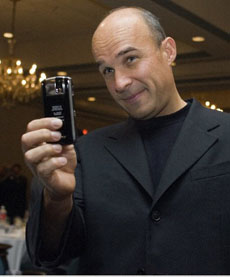 BlackBerry smartphone maker Research in Motion’s revenue fell significantly this quarter, due to lower sales of its newest tablet computer, the BlackBerry PlayBook, and shy consumers waiting for the BlackBerry 7 phones that launched three weeks before the quarter ended.
BlackBerry smartphone maker Research in Motion’s revenue fell significantly this quarter, due to lower sales of its newest tablet computer, the BlackBerry PlayBook, and shy consumers waiting for the BlackBerry 7 phones that launched three weeks before the quarter ended.
Research in Motion (RIM) brought in $4.2 billion in revenue this quarter, down 10 percent from $4.6 billion in the second quarter of 2011 fiscal year, the company reported in its quarterly earnings on Thursday.
Wall Street analysts expected the company to make $4.5 billion in revenue. But Sales of the company’s tablet computer, the PlayBook, were disappointing at 200,000 units shipped. Wall street analysts were expecting the company to sell more than 400,000 PlayBooks. Wireless provider Sprint canceled its plans to supply a 4G-enabled version of the PlayBook last month.
“PlayBook sales were well below expectations,” Research in Motion co-chief executive Mike Lazaridis said. “PlayBook has established itself as a high performance tablet, which we believe will be successful in a market in its infancy but is rapidly growing.”
AI Weekly
The must-read newsletter for AI and Big Data industry written by Khari Johnson, Kyle Wiggers, and Seth Colaner.
Included with VentureBeat Insider and VentureBeat VIP memberships.
The company’s costs remained steady at $2.6 billion, sending its net income for the second operating quarter of its 2012 fiscal year down to $329 million from $797 in the same quarter a year earlier — a 59 percent drop. Research in Motion spent $780 million on patents from Nortel.
RIM began rolling out its BlackBerry 7 smartphones during the second half of the second quarter this year. The company shipped 10.6 million BlackBerry units, below Wall Street expectations of 11.6 million units shipped in the second quarter. Many BlackBerry customers decided to wait until the next line of BlackBerry 7 smartphones came out before picking up a new phone, contributing to weaker sales, co-chief executive Jim Balsillie said.

The company said in its last operating call that it expected to release its next generation of high-end smartphones, called QNX smartphones, early next year. But Lazaridis dodged a question on the call asking whether that launch window was still open.
Research in Motion said it would shed 2,000 jobs in July, a restructuring plan that is largely finished, Lazaridis said. Shares of Research in Motion were down 18 percent in extended trading on Thursday.
Here are the highlights from the company’s earnings conference call:
- The BlackBerry PlayBook was launched in Asia in the second quarter, and many partners are jumping on board with the device, Balsillie said. “The first BlackBerry 7 device launched in the region, the BlackBerry Bold 9900, is a hit with customers.”
- “Early results from the BlackBerry 7 launch are strong, we anticipate acceleration of the uptake of BlackBerry devices for the rest of the year and up to 2012,” he said.
- “The successful launch of the BlackBerry 7 launch is a critical part of our growth,” Balsillie said. “BlackBerry has a lot of runway that we can continue until the launch of QNX-based smartphones.”
 Research in Motion has completed most of its workforce reduction plans. “It’s always difficult to reduce headcount, but we are a dynamic business,” Balsillie said.
Research in Motion has completed most of its workforce reduction plans. “It’s always difficult to reduce headcount, but we are a dynamic business,” Balsillie said.- “While getting to this point has been choppy for RIM, we believe the architecture underlying the company is sound,” he said.
- “This is the largest and most successful launch of our smartphones in BlackBerry’s history,” Lazaridis said.
- BlackBerry users have downloaded BlackBerry social apps more than 13 million times.
- Current availability of applications and content has limited initial uptake of the PlayBook in the market, Lazaridis said. “The ability to push out upgrades over the air is a significant advantage.”
- Native email, enhanced web browsing, new consumer apps and multimedia content and the Android player are coming to the PlayBook in the next software update.
- The company is launching a program to increase adoption of the device in the enterprise, the company said. “We are confident this will increase demand.”
- The company’s new QNX-based smartphone specs and hardware design details will come out well before the device’s launch, Lazaridis said. That’s because the company needs to promote development for the device early, he said.
- The company has experienced increased sell-through and decreased churn with North American partners, Balsillie said. BlackBerry 7 accounted for 35 percent of the overall sell-through in North America, he said. “These are really good results for a completely new product launch.”
- Research in Motion is announcing its new development infrastructure for QNX smartphones at DevCon later this year. “We’re very excited that we have the development phones operating right now and testing right now,” Lazaridis said. He dodged a question about whether QNX smartphones would still come out early next year.
- “Patents is a pretty complicated, multi-faceted day, I think we’ve done a pretty commendable job fortifying ourselves and not attractive as someone to pursue by another practitioner,” Balsillie said. “With all the people trying to spin off the next generation of intellectual property, this is something you have to watch.”
- QNX is still targeted to high-end customers, with BlackBerry 7 devices making up a majority of the company’s smartphone sales, Lazaridis said.
- All participants buying Nortel’s patents have licenses to the patents, so each company is insulated from potential lawsuits and has some ownership of the patents, Balsillie said.
VentureBeat's mission is to be a digital town square for technical decision-makers to gain knowledge about transformative enterprise technology and transact. Learn More
